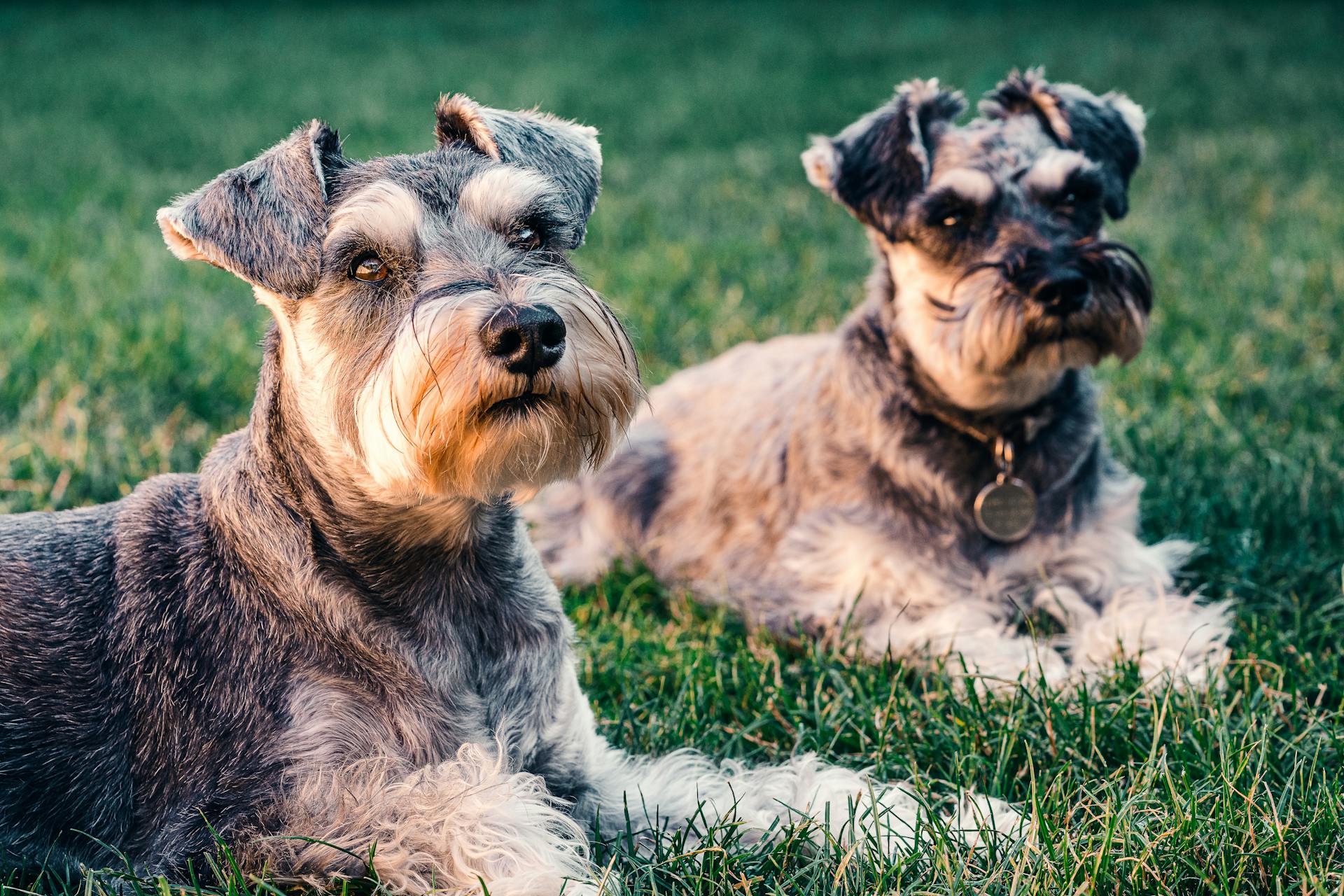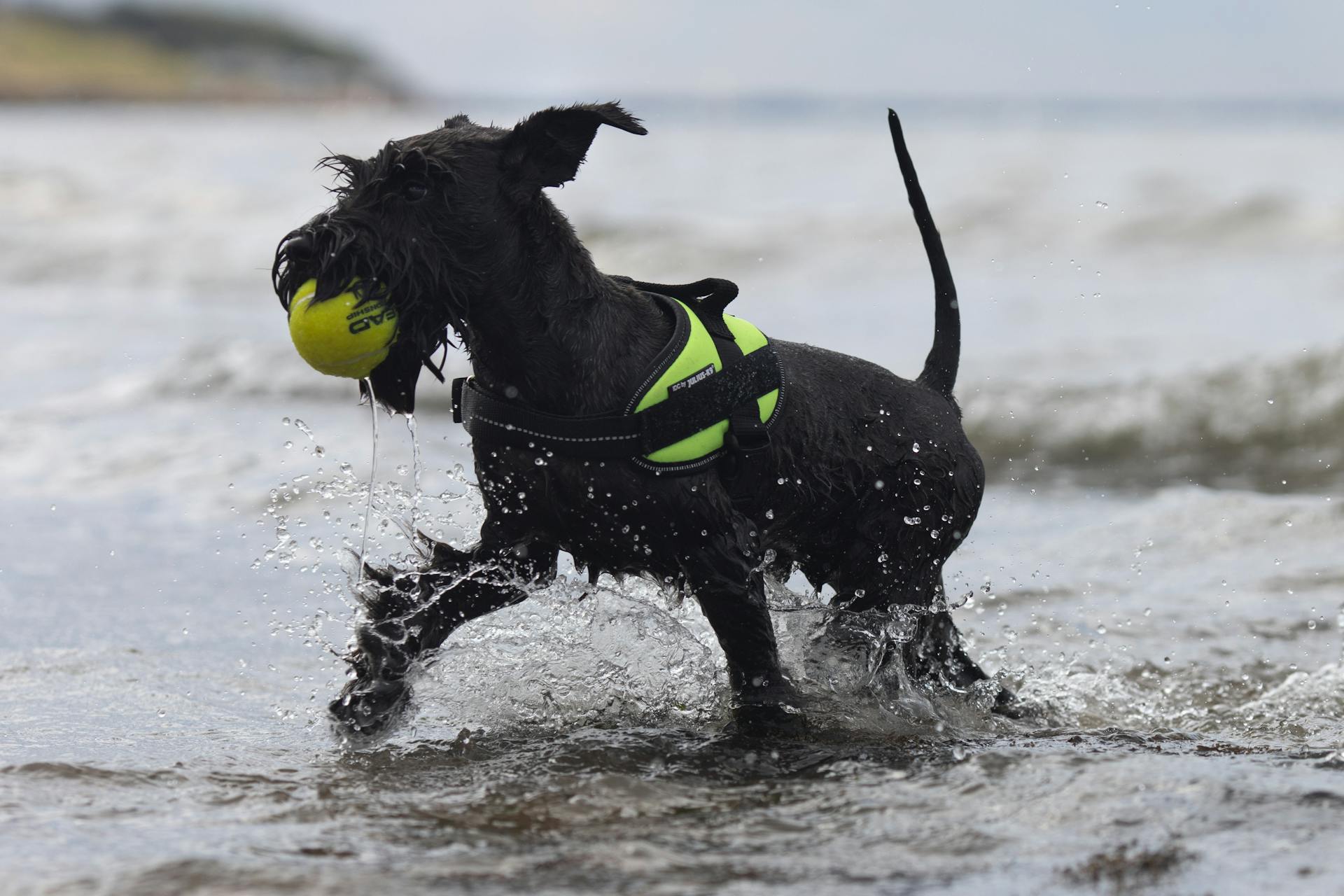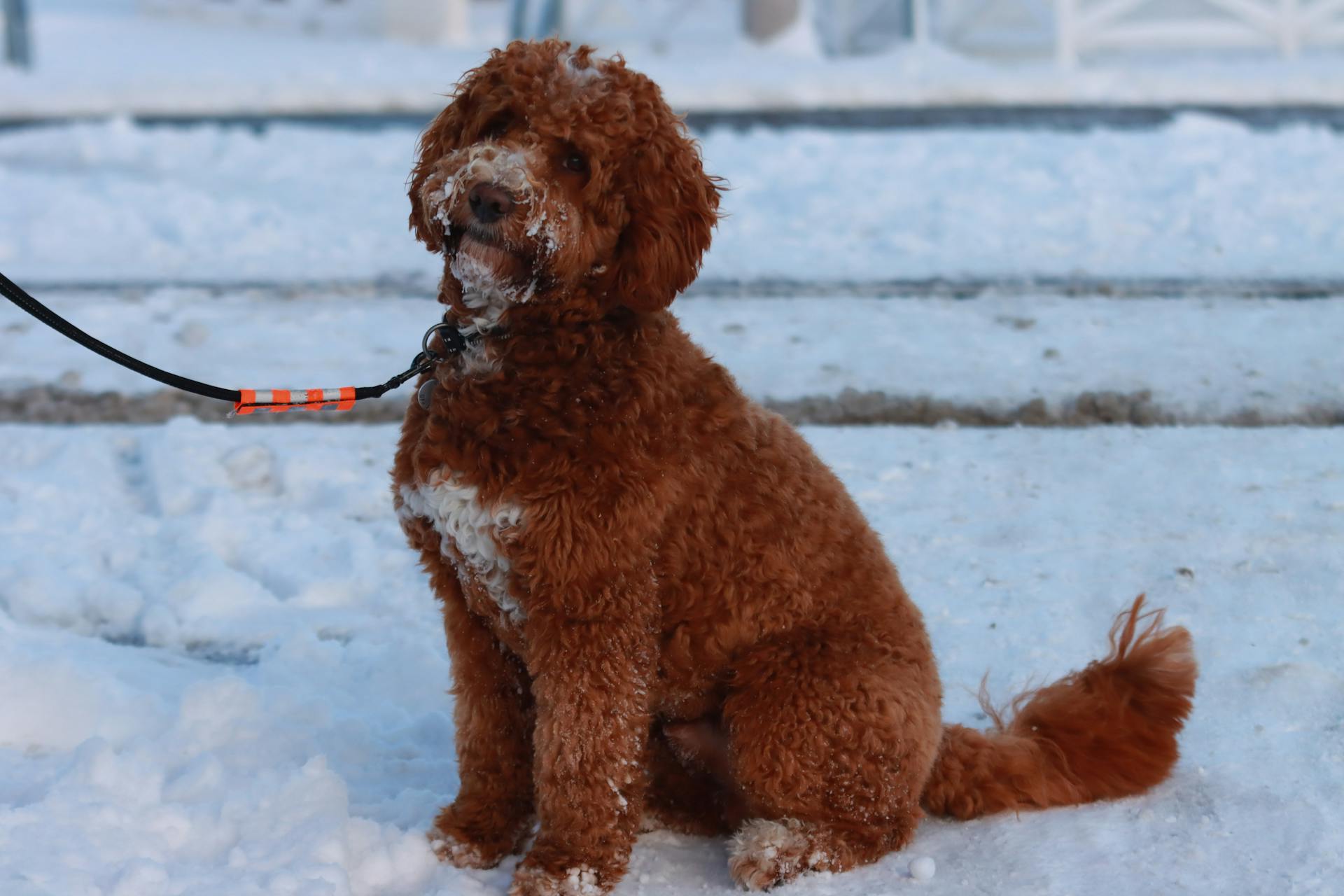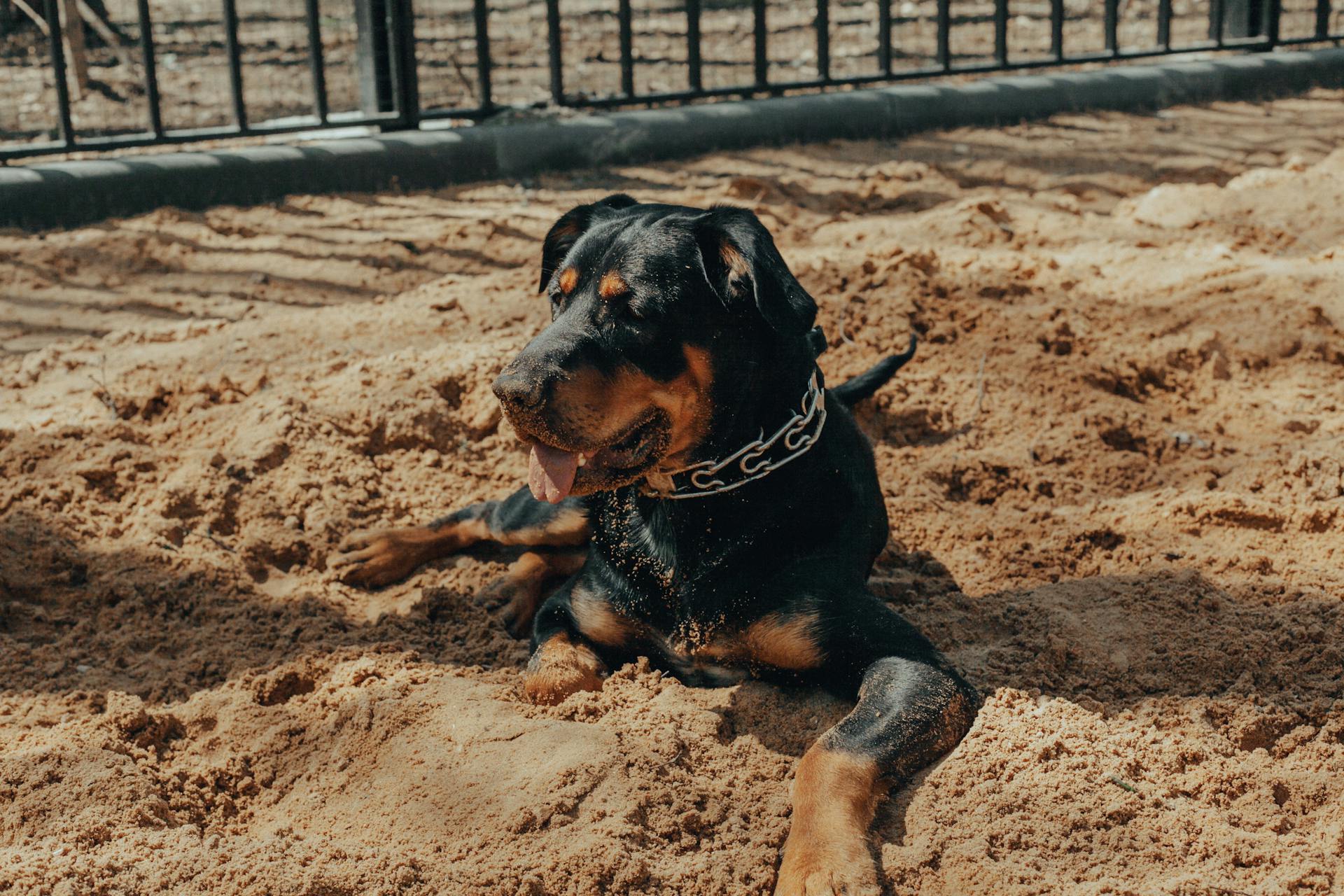
Miniature Schnauzers are a relatively small breed, weighing between 11 and 18 pounds on average.
They have a distinctive beard and eyebrows, which are actually a part of their facial hair, and are a key characteristic of the breed.
Their hypoallergenic coat is a major plus for people with allergies, as it sheds very little.
Miniature Schnauzers are highly intelligent and active dogs, requiring regular exercise and mental stimulation to prevent boredom and destructive behavior.
They are also known for being loyal and protective of their families, but can be wary of strangers due to their strong instinct to defend their loved ones.
In terms of grooming, Miniature Schnauzers require regular brushing and trimming to prevent matting and keep their coat looking its best.
You might enjoy: Dogs Breeds That Start with B
Physical Characteristics
Miniature Schnauzers have a very square-shaped build, measuring 11 to 14 inches tall and weighing 10 to 15 pounds for females and 11 to 18 pounds for males.
Their double coat is made up of wiry exterior fur and a soft undercoat, with recognized coat colors including black, pepper and salt, black and silver, and pure white.
The pepper and salt coloration is a banded shade of black, gray, and silver, fading to a gray or silver at the eyebrows, whiskers, underbody, and legs.
Their rectangular head is characterized by a bushy beard, mustache, and eyebrows, with oval and dark-colored eyes.
Their ears are naturally v-shaped and forward-folding, but when cropped, they point straight upward and come to a sharp point.
Their tails are naturally thin and short, and may be docked (where permitted).
Their front legs are straight and rigid, and their feet are short and round, with thick, black pads.
Readers also liked: Water Loving Dogs for Short Nyt
Temperament and Training
Miniature schnauzers are known for their alert and spirited nature, but also for being obedient to command. They're generally easy to train and make excellent watchdogs.
Their intelligence is one of their best qualities, ranking 12th out of 140 breeds in Stanley Coren's book The Intelligence of Dogs. This intelligence can make them bored with repetitive training, so it's essential to keep training sessions fun.
See what others are reading: Pembroke Corgi Training
Miniature schnauzers are semi-open to meeting strangers and other dogs, but their high prey drive means they might not coexist peacefully with smaller household pets. They're also prone to barking, which can be a challenge for some owners.
To prevent bad habits from forming, it's crucial to start training and socialization as early as possible. This will help them become happy, well-adjusted dogs.
Here are some key traits to keep in mind when training a miniature schnauzer:
With patience, consistency, and positive reinforcement, you can help your miniature schnauzer become a well-behaved and loyal companion.
Health and Care
Miniature Schnauzers are generally a healthy breed, but like all breeds, they can be prone to certain health issues. They have a life expectancy of around 13-14 years, which is slightly lower than the average for crossbreeds.
A UK study found that Miniature Schnauzers have a life expectancy of 13.3 years, while a Japanese study found it to be 13.4 years. These studies also highlighted the breed's predisposition to certain health issues, including gall bladder mucoceles, congenital portosystemic shunts, and von Willebrand disease.
Readers also liked: Average Lifespan of Pug Dog
Regular grooming is essential for Miniature Schnauzers, as their coat requires regular combing and may need to be professionally clipped every six weeks to prevent matting. They also need regular ear, eye, and dental care to prevent infections.
Some common health issues that affect Miniature Schnauzers include cataracts, hyperlipidemia, pancreatitis, liver shunt, urinary stones, and Mycobacterium Avium Complex (MAC). It's essential to keep an eye out for these conditions and work with a veterinarian to prevent or manage them.
Here are some common health concerns associated with Miniature Schnauzers:
- Cataracts: This condition causes the lens of the eye to become cloudy, reducing vision.
- Pancreatitis: This is inflammation of the pancreas, which can be painful and potentially life-threatening.
- Bladder stones: These can cause symptoms like blood in the urine and difficulty urinating.
- Atopy: This is a hypersensitivity to certain allergens, causing itching and skin trauma.
- Urolithiasis: This is the formation of stones in the urinary tract, which can be painful and cause other symptoms.
Care and Upkeep
Miniature schnauzers require regular grooming to prevent their coat from becoming a "tousled mess." Combing their coat twice a week is a must, and ideally, they should be plucked or clipped every six weeks to maintain their harsh coat.
Their long beard needs daily washing to rid it of food and saliva that can cause it to smell. A monthly bath is also necessary for the rest of their coat.

Regular checks on their ears, eyes, teeth, and nails are crucial, as with all dogs. Their ears should be checked at least weekly for wax buildup and abnormalities.
A daily brushing will remove any loose fur and prevent tangles. You'll also want to clean and brush out their beard, which may collect food and dirt.
Here's a breakdown of their grooming needs:
- Coat: combed twice a week, plucked or clipped every six weeks
- Beard: washed daily
- Ears: checked weekly
- Teeth: brushed daily
- Nails: trimmed monthly
- Bath: monthly
Health
Miniature Schnauzers are generally a healthy breed, but like all breeds, they can be prone to certain health issues. A UK study found a life expectancy of 13.3 years for the breed, higher than the 12-year average for crossbreeds.
One health issue that affects Miniature Schnauzers is gall bladder mucoceles, with a significant predisposition found in a Japanese study. The odds ratio for this condition is 5.23.
Another issue is congenital portosystemic shunts, with 1% of Miniature Schnauzers having the condition compared to 0.05% for mixed-breed dogs.
Miniature Schnauzers are also prone to von Willebrand disease (vWD), an inherited bleeding disorder caused by a deficiency of von Willebrand factor.
Related reading: Mini Schnauzer Health Issues

Atopic dermatitis is a common issue in Miniature Schnauzers, which can cause skin problems and discomfort.
Schnauzer comedo syndrome is a unique condition that affects the hair follicles of Miniature Schnauzers, causing small comedones to form on the dorsal spine.
Here are some common health problems that can affect Miniature Schnauzers:
- Cataracts: This condition causes the lens of the eye to become cloudy.
- Hyperlipidemia: This is high cholesterol or triglycerides, which can be inherited and cause digestive problems, skin problems, and other issues.
- Pancreatitis: This is inflammation of the pancreas, which can be painful and potentially life-threatening.
- Liver shunt: This is a congenital abnormality that can lead to serious health issues.
- Urinary stones: These can develop for various reasons and can cause symptoms like blood in the urine and difficulty urinating.
- Mycobacterium Avium Complex (MAC): This is a rare but fatal condition that affects the immune system.
Some other health concerns that can affect Miniature Schnauzers include cataracts, pancreatitis, bladder stones, and atopy. It's essential to feed a high-quality, nutritionally balanced diet and to monitor their health closely.
Readers also liked: Embark Breed & Health Dog Dna Test Stores
Pros and Cons
Miniature Schnauzers are a wonderful breed, but like any pet, they have their pros and cons. One of the biggest advantages of owning a Miniature Schnauzer is that they are friendly and affectionate, making them a great addition to families with kids.
They are also relatively low-maintenance when it comes to shedding, which is a plus for those who suffer from allergies or simply prefer less dog hair.
Here are some key pros and cons to consider:
- Pros:
- Friendly and affectionate
- Can get along well with kids
- Doesn't shed much
- Cons:
- Can be very vocal
- Somewhat involved grooming needs
- High prey drive
Pros of
Miniature Schnauzers are a joy to have around, and here's why:
Friendly and affectionate, they make great companions. They'll often follow you around the house, eager to be by your side.
One of the best things about Miniature Schnauzers is how well they get along with kids. They're patient and gentle, making them a great addition to families.
As for grooming, you'll be happy to know that Miniature Schnauzers don't shed much. This makes them a great choice for people with allergies or who prefer less dog hair.
Check this out: Best All around Dog Breed
Cons of
Miniature Schnauzers can be quite the handful, and here are some things to consider.
They're known for being very vocal, so be prepared for a lot of barking and yapping.
Their grooming needs are somewhat involved, requiring regular brushing and trimming to prevent matting.
If you have small pets in the house, you'll need to be careful - Miniature Schnauzers have a high prey drive and might see them as targets.
Here are some specific cons to consider:
- Can be very vocal
- Somewhat involved grooming needs
- High prey drive
Frequently Asked Questions
Are mini schnauzers lap dogs?
Mini Schnauzers are not lazy lapdogs, despite their small size. They require regular exercise and activity to stay happy and healthy.
Do mini schnauzers bark a lot?
Yes, Miniature Schnauzers are known to be quite vocal and bark frequently. If you're considering adopting one, be prepared for regular barking and high maintenance.
Featured Images: pexels.com


